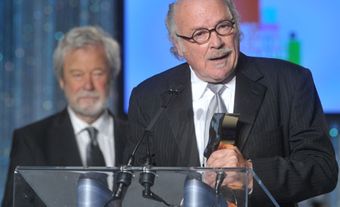
The Genie Awards were presented between 1980 and 2012 by the Academy of Canadian Cinema & Television to honour distinguished achievement in the Canadian film industry. They succeeded the Canadian Film Awards (1949–78) and were merged with the Gemini Awards in 2013 to form the Canadian Screen Awards. The Genie’s French-language counterpart, the Jutra Awards, continue to honour filmmaking in Québec.
Background
Dissatisfied with the international jury system of the Canadian Film Awards, and inspired by the growth of the Canadian film industry during the tax-shelter years, a small group of Canadian filmmakers — Ron Cohen, Andra Sheffer, Robert Lantos, Paul Hoffert and George Appleby — began in 1978 to organize an Academy-style professional association to celebrate and promote filmmaking in Canada. The group recruited Bill Marshall, co-founder of the Toronto Festival of Festivals (now the Toronto International Film Festival) and president of the Canadian Association of Motion Picture Producers, and together they incorporated the Academy of Canadian Cinema (now the Academy of Canadian Cinema & Television).
The Academy attracted 100 founding members, all working professionals in the industry. It absorbed the Canadian Film Awards and created in their place the Genie Awards, which were voted on by the Academy’s peer groups. The “Etrog” statuette (designed by sculptor Sorel Etrog) that had been presented to winners since 1968 was renamed the Genie to symbolize “the magic of filmmaking and the hidden genie seeking expression in all creative people.” The first Genie Awards ceremony was held on 20 March 1980 at Toronto’s Royal Alexandra Theatre.
In 2012, following “extensive industry consultation and outreach,” the Academy announced that it would merge the Gemini and Genie Awards into the Canadian Screen Awards, which were first held in Toronto on 3 March 2013 and broadcast on CBC Television. Academy CEO Helga Stephenson explained that merging the awards for television and film was part of an effort “to put a much bigger spotlight on those industries.”
Nomination Process
In order to be eligible for a Genie Award, a film was required to qualify as a Canadian production or co-production (as defined by CAVCO and/or CRTC criteria), and to have been released theatrically in Canada between 1 January and 31 December of the previous year.
Each year, nominating committees — made up of Academy members, filmmakers, critics and other industry professionals — reviewed all submissions to determine nominations across a range of categories. Members of the Academy's Cinema division were then permitted to vote for categories directly related to their membership branch (editing, cinematography, music, etc.), as well as for Best Motion Picture and all of the acting categories. In 2010, the Academy introduced online voting, with results tabulated by PricewaterhouseCoopers, the Academy's official ballot auditors.
Special Awards
The Genie Awards became home to the Golden Reel Award, for the film with the year’s highest box-office gross, and the Air Canada Award, for an individual’s outstanding contribution to the business of filmmaking in Canada. The Claude Jutra Award, for best director of a first feature film, was created in 1993.
Best Picture Winners
The winners of the Genie Award for Best Motion Picture are listed below, along with the producer(s) of each film.
1980 — The Changeling (Joel B. Michaels, Garth Drabinsky)
1981 — Les Bons Débarras (Claude Godbout, Marcia Couëlle)
1982 — Ticket to Heaven (Vivienne Leebosh)
1983 — The Grey Fox (Peter O'Brian)
1984 — The Terry Fox Story (Robert Cooper)
1985 — The Bay Boy (John Kemeny, Denis Héroux)
1986 — My American Cousin (Peter O'Brian)
1987 — Le Déclin de l'empire américain (René Malo, Roger Frappier)
1988 — Un Zoo la nuit (Roger Frappier, Pierre Gendron)
1989 — Dead Ringers (David Cronenberg, Marc Boyman)
1990 — Jésus de Montréal (Roger Frappier, Pierre Gendron)
1991 — Black Robe (Robert Lantos, Stéphane Reichel, Sue Milliken)
1992 — Naked Lunch (Jeremy Thomas, Gabriella Martinelli)
1993 — Thirty-Two Short Films about Glenn Gould (Niv Fichman)
1994 — Exotica (Atom Egoyan, Camelia Frieberg)
1995 — Le Confessionnal (Denise Robert, David Puttman, Philippe Carcassonne, Steve Norris)
1996 — Lilies (Anna Stratton, Robin Cass, Arnie Gelbart)
1997 — The Sweet Hereafter (Atom Egoyan, Camelia Frieberg)
1998 — no award presented
1999 — The Red Violin (Niv Fichman)
2000 — Sunshine (Robert Lantos, Andras Hamori)
2001 — Maelström (Roger Frappier, Luc Vandal)
2002 — Atanarjuat(The Fast Runner) (Zacharias Kunuk, Norman Cohn, Paul Apak)
2003 — Ararat (Robert Lantos, Atom Egoyan)
2004 — Les Invasions barbares (Denise Robert, Daniel Louis)
2005 — Les Triplettes de Belleville (Paul Cadieux)
2006 — C.R.A.Z.Y. (Pierre Even, Jean-Marc Vallée)
2007 — Bon Cop Bad Cop (Kevin Tierney)
2008 — Away From Her (Daniel Iron, Simone Urdl, Jennifer Weiss)
2009 — Passchendaele (Niv Fichman, Francis Damberger, Paul Gross, Frank Siracusa)
2010 — Polytechnique (Don Carmody, Maxime Rémillard)
2011 — Incendies (Luc Déry, Kim McCraw)
2012 — Monsieur Lazhar (Luc Déry, Kim McCraw)
See also: The History of the Canadian Film Industry; The Cinema of Québec.

 Share on Facebook
Share on Facebook Share on X
Share on X Share by Email
Share by Email Share on Google Classroom
Share on Google Classroom

